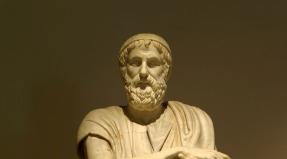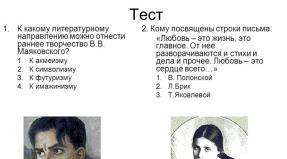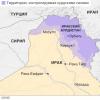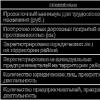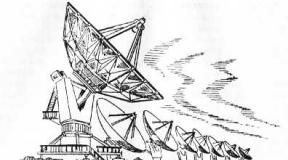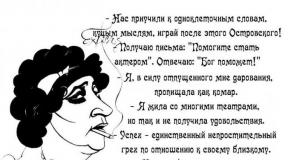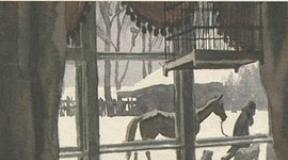When Homer was born. Homer: biography, short and interesting facts. Bibliography of Homeric Hymns
Homer is a legendary ancient Greek epic poet, who is credited with the authorship of the poems The Iliad, The Odyssey and other works (in particular, a collection of 33 so-called Homeric hymns - hymns to the gods).
There is no reliable information about the personality and time of Homer's life. According to legend, seven cities disputed the right to be called his homeland, including Smyrna (the modern city of Izmir in Turkey), whose claims to this seem to be the most justified by scientists. Homer is believed to have lived in the 8th century BC. e. He was portrayed as a blind wandering aeda singer (aeda are poets and singers who accompanied themselves on a four-stringed lyre; in terms of social status they were equated with soothsayers, doctors and architects, that is, they were higher than sculptors and artists).
Until now, the so-called Homeric question is being discussed - the question of the authorship of the Iliad and the Odyssey, as well as what part of these works is literary creativity itself, and what part is folklore. Some researchers (including the largest German classical philologist Friedrich August Wolf, who laid the foundation for the Homeric question in his work in 1795 " Prolegomena ad Homerum "-" Prolegomena to Homer ") say that" Iliad "and" Odyssey "were written at different times and consist of separate epic songs, and therefore cannot belong to the same author. Other researchers, including the classic of German literature of the 18th century Johann Christoph Friedrich Schiller, argue the opposite. According to modern research, Homer is the author of the Iliad, but the Odyssey apparently belongs to the pen of one of his students (?), Who processed the poem later.
Today, one thing is indisputable: both the Iliad and the Odyssey are outstanding works of antiquity, which have been delighting readers all over the world for 3000 years.
The Iliad was apparently created in the 9th-8th centuries BC. e. The poem, consisting of 24 books, is written on the basis of the legend about the Trojan War and is named after the Greek city of Ilion (Troy). Its main character - Achilles - acts as an avenger for the death of his friend Patroclus. Pictures of battles in the poem alternate with pictures of peaceful life in Troy besieged by the Greeks and with scenes of the dispute between the gods on Olympus: "Some helped the Greeks, others - the Trojans, and only the almighty Zeus judged everyone." The Iliad was brilliantly translated into Russian by the 19th century poet Nikolai Ivanovich Gnedich.
Consisting of 24 books "The Odyssey" tells about the 10-year wanderings of the hero of the same name and about his faithful wife Penelope. Many trials fell to the lot of Odysseus, but everywhere, wherever fate threw him, and in particular on the island of Ogygia, where “Calypso reigned, a light-haired, sweet-speaking nymph, the daughter of the titan Atlas,” he “dreamed of the day when he would return to Ithaca and will meet his elderly father Laertes, his faithful wife Penelope and his dear son. " In the end, Odysseus returns home unrecognized, his son Telemachus helps him when beating Penelope's suitors. Soon Odysseus hugged "his faithful wife, and they wept with tears of happiness." All subsequent reign of "wise Odysseus brought Ithaca and her people happiness and prosperity." The classic Russian translation of this poem belongs to the 19th century poet Vasily Andreevich Zhukovsky.
Homer(Greek Ὅμηρος, Lat. Homerus) - the first and most famous of the ancient Greek poets, the recognized founder of European literature. He is credited with creating the classic poems - The Iliad and The Odyssey. According to a number of ancient authors (including Cicero), Homer's poems were first put together and recorded at the direction of the Athenian tyrant Pisistratus or his son Hipparchus (6th century BC). “One or more persons, man or woman” - this is Homer's Encyclopedia of Science Fiction, edited by Klute and Langford. A little caricatured, but in general a true reflection of what modern science knows about Homer, that is, nothing. Indeed, disputes about whether the author of the Iliad and the Odyssey was one, or at least two of them, have been going on since the 18th century. And Samuel Butler's (1892) assumption that Homer was a woman remains extremely popular in the English-speaking world. Robert Graves was generally convinced that the author of The Odyssey was the heroine of the same poem, Nausicaä, the daughter of the king of the Faecias.
In fact, Homer is a legendary person, since there is no reliable information about himself and about his life. Some considered him to be a contemporary of the Trojan War (early 12th century BC). Herodotus dated Homer's time around the 9th century. BC. (according to Herodotus, Homer lived 400 years before him). Most modern scholars are inclined to believe that Homer lived in the 8th century BC, indicating Chios or some other region of Ionia on the coast of Asia Minor as his main place of residence.
Seven cities are fighting for the source of the wise Homer:
Smyrna, Chios, Colophon, Salamis, Rhodes, Argos and Athens.
The named seven do not exhaust, however, the list of candidate cities. According to Herodotus and Pausanias, Homer died on the island of Ios in the Cyclades archipelago. Probably, the Iliad and Odyssey were built on the Asia Minor coast of Greece, inhabited by Ionian tribes, or on one of the adjacent islands. However, the Homeric dialect does not provide accurate information about the nationality of Homer, since it is a combination of the Ionian and Aeolian dialects of the ancient Greek language.
Shrouded in mystery and the name of the narrator (written literature did not exist yet). The meaning of the name "Homer" (it is first encountered in the 7th century BC, when Callinus of Ephesus called him the author of "Thebaida") was tried to explain back in antiquity, the options "hostage" (Hesychius), "following" (Aristotle) were proposed. or "blind man" (Efor Kimsky), later proposals were made to attribute to him the meaning of "adjuster" or "accompanist". Some believe that in its Ionian form, the name Ομηρος is almost certainly a real personal name, others (for example, the Brockhaus and Efron Encyclopedia) believe otherwise:
Nevertheless, the form of the name (its transparent etymology from homo - "s" and the root ar - "fit", compare hodegos - "guide", from hodog "path" and the root ag - "lead") denounces in him the hero-eponym of the so-called Homerid, the oldest school of epic singer-storytellers, to whom he treated the same as the undoubtedly mythical Daedalus to the Daedalids, the most ancient school of sculptors.
Traditionally, Homer is portrayed as a blind man. It is most likely that this idea is not based on the real facts of Homer's life, but is a reconstruction characteristic of the genre of ancient biography. Since many outstanding legendary soothsayers and singers were blind (for example, Tiresias), according to ancient logic, linking the prophetic and poetic gift, the assumption of Homer's blindness looked very plausible. In addition, the singer Demodoc in the Odyssey is blind from birth, which could also be perceived as autobiographical. In any case, since Hellenistic times, Homer has been portrayed in art as an inspired, blind old man. The best bust of Homer, according to the Brockhaus and Efron Encyclopedia, is the Sanssouci bust, probably a work of the Rhodes school.
Already during the classical era of Ancient Greece, Homer was considered a classic and the progenitor of literature. The education system was built on the study of Homer's poems. They memorized partially or even completely, recitations were arranged on their topics. This system was adopted by Rome, where the place of Homer from the 1st century. n. e. occupied by Virgil. The main work of Roman literature, the heroic epic "Aeneid" by Virgil, is an imitation of the Odyssey (the first 6 books) and the Iliad (the last 6 books). The influence of Homeric poems can be seen in almost all works of ancient literature.
During the Middle Ages in Europe, Homer was almost forgotten (primarily due to ignorance of the ancient Greek language), but the plot of the Trojan War remained well known thanks to the Latin novels of Dareth and Dictis.
In Byzantium, Homer was read and studied thoroughly. Dozens of complete Byzantine manuscripts of Homeric poems have survived to this day, which is unprecedented for works of ancient literature. In addition, Byzantine scholars rewrote, compiled, and created scholias and commentaries on Homer. Archbishop Eustathius's commentary on the Iliad and Odyssey in a contemporary critical edition occupies seven volumes.
In the last period of the Byzantine Empire and after its collapse, Greek manuscripts and scholars entered the West, and the Renaissance era rediscovered Homer for itself. Dante Alighieri places Homer in the first circle of Hell as a virtuous non-Christian.
In Russia, fragments from Homer were translated by Lomonosov, the first large poetic translation (six books of the Iliad in Alexandrian verse) belongs to Yermil Kostrov (1787). Especially important for Russian culture are the translations of Nikolai Gnedich's Iliad (completed in 1829), which was made from the original with particular care and very talented (according to Pushkin and Belinsky's reviews), and The Odyssey by V.A. Zhukovsky.
In addition to the Iliad and the Odyssey, Homer was credited with a number of later poems and poems, of which he could not have been the author, a number of them - Homeric Hymns, The War of Mice and Frogs (Batrachomyomachia) - we included in bibliography.
The difference between the two poems is clearly manifested precisely in relation to the fantastic. In the Iliad, we see only family scenes between the inhabitants of heaven and their intervention in the war (however, invisible to mortals). Canto 18 mentions Hephaestus' assistants, virgins made of gold:
Handmaidens, taking Vladyka by the arms,
They walked in gold, like beautiful virgins alive,
And which the immortals have learned to know-how.
This place is often called the first depiction of robots (androids) in world literature.
The Trojan War (with the participation of the gods) is one of the storylines of Dan Simmons's "Troy" dilogy.
The Odyssey is replete with magical objects, magical actions, wonderful places. Every island Odysseus visited is a variant of the other world. Odysseus also travels to the real otherworldly (afterlife) world, to the entrance to Hades. To reach it, he floats south, but at the same time finds himself somehow far in the North, in the country of the Cimmerians, where eternal dusk reigns. Where Cocytus and Phlegeton flow into Acheron, Odysseus with fresh blood lures the dead, disembodied shadows that have lost the memory of earthly life. Among those who came (they have to be driven away with a sword) and the mother of Odysseus - and he did not even know that she had died. However, he is waiting for one thing needed - the soothsayer Tiresias. He gives Tiresias to drink sacrificial blood and receives a prophecy about his future path. After that, he gives blood to his mother, who tells him about household chores, and then to Achilles and Agamemnon (that Agamemnon was killed, Odysseus does not know either). In response to the remark to Achilles that he reigns over the dead here, he says that it is better to be the last laborer in this world than a king on that one. This is the most impressive episode of the poem to date.
Lotophages, lotus eaters, lose their memory, but they acquire bliss. The satellites of Odysseus, bewitched by Circe, lose their memory, as well as their human appearance, but this sorcery is reversible.
The very word "odyssey" has become a household word, meaning a journey associated with dangerous adventures. Odysseus began to be perceived as an example of an eternal traveler, obsessed with a thirst for wandering and the search for the unknown (although in the poem he floats to his homeland and even refuses the proposed immortality in order to return home).
The Odyssey became the story archetype for the fantasy journey genre, from Apollonius of Rhodes' Argonautics and Lucian's parody True Story to Swift's Travels of Gulliver and Jules Verne's Extraordinary Travels.
Homer - one of the most ancient poets of antiquity, is the author of world famous epic works, including the Odyssey and the Iliad. He lived in the 8th - 7th centuries BC. According to Herodotus, the writer created his masterpieces in the ninth century.
Some chronographs claim that Homer was a contemporary of the Trojan War, and he died in the 12th century BC. Research proves that more than half of the papyri found came from his pen. Little is known about the life path and personality of the creator.
Myths and facts from the life of the poet
There are still debates among scientists about the date and place of Homer's birth. Most of them believe that the years of the poet's life fell on the eighth century BC. If we talk about the place where the author of the epic poems lived, seven cities are most often called, each of which is located in the territory of the country of Ionia.
Among them are Rhodes, Smyrna, Athens, Colophon, Argos, Salamis and Chion. His most famous epic poems were written on the Asia Minor coast of Greece. There is a possibility that this happened on one of the islands that adjoined this country.
The Greeks are actively spreading the legend that the poet was born in Smyrna near the Melesa River. His mother is called Crifeida. According to the stories written at that time, the scientist man Femius fell in love with Homer's mother, after which he took his son to his disciples. The young man learned quickly, and soon was able to surpass his teacher. After Femiya's death, the school passed into the possession of the poet. People from all over the country came to him for a wise conversation. Among them was the sailor Mentes, who persuaded Homer to go on a journey with him, closing the school.

Legends say that the young creator was very curious, so he carefully studied the culture of each place he visited. He noticed any little things, and then gradually began to describe the events he saw. The Greeks claim that the writer went blind after visiting Ithaca. Some sources state that it was only temporary blindness, and vision was quickly restored. Others are inclined to believe that Homer remained blind until the end of his days. It was during this period that the dawn of his work fell.
Homer traveled a lot, helped people, even raised the children of one rich gentleman. In adulthood, he settled in the city of Chios, where he founded a school. The locals showed him respect in every possible way, so the writer could teach their children in comfort. After a while, he got married, and the family had two sons and a daughter.
Researchers have drawn some facts from ancient manuscripts and paintings depicting the writer. So, in most of the sculptures, he was shown blind. At that time, it was customary to portray representatives of the literary professions as blind, so it is impossible to prove whether this information is true. The Greeks believed that there was some connection between the writing talent and the inability to see. Moreover, one of the characters in the Iliad also had vision problems. That is why literary scholars are inclined to conclude that this feature was just a reconstruction.
To draw conclusions about the origin of the author, scientists studied in detail the language of his works. But even the dialectical features of the language did not help to get closer to the truth, since they combined too many words from the Ionian and Aeolian dialects. This combination is called a special poetic koine, formed long before the birth of the creator. The meaning of Homer's name is traditionally deciphered as "blind man" and "hostage."
It is also known about a kind of poetic duel in which Homer and Hesiod participated. They read their works to the audience of one of the islands. King Paned was appointed as the judge of this battle. Homer lost the competition because there were too many calls for war and battle in his poetry. Unlike him, Hesiod advocated peace, therefore he actively promoted agriculture and hard work for the good. However, visitors to the island were more supportive of the losing poet.

It is known that death overtook Homer on an island in the Cyclades archipelago. He was very saddened, did not look at his feet, as a result of which he stumbled on a stone. Some sources claim that the poet died of grief, because shortly before the collision he could not solve the riddle of the local fishermen. Other researchers are inclined to believe that Homer was sick.
Homer's work
As mentioned above, Homer was the author of acclaimed epic poems such as The Iliad and The Odyssey. In addition, he was often credited with other works that were published much later. Among them are a comic poem called "Margit", a cycle of "Cypriots", "Homeric hymns" and other works.
Representatives of the Library of Alexandria have done a tremendous job to establish the authorship of each work. They studied the manuscripts, compared the language and the storyline that the authors of the poems adhered to. As a result, even today there are disputes among scholars about which texts belong to Homer, and which ones were unfairly attributed to him.
Philologists admit that it was this poet who became the first of his kind. They are struck by the unity of the action, the original concept and style of the story. According to the researchers, the poems reflect the technique of folk singers. Like them, Homer created stable phrases, from which later one could easily create songs of a large size.

Homeric question
All discussions related to the two epic poems are usually called the Homeric question. Indeed, there have been many dubious facts in the history of the study of these works. Even in antiquity, some people stated that Homer borrowed the plot for the poems from the poetess Fantasia, who lived during the Trojan War.
For a long time, European art critics adhered to the point of view of the undoubted authorship of the poet. It was also taken for granted that the Iliad and The Odyssey were published with a minimum of corrections. But at the end of the 17th century, philologists discovered other versions of the Iliad's songs. This called into question not only the authorship of Homer, but also the integrity of the work. Some researchers argued that each song was separate from the others, while others advocated the unity of the author's thought.
Since epic poems have undergone many editing options, literary scholars consider it inappropriate to attribute authorship to just one. The texts revealed inconsistencies in the temporal-spatial framework, deviations from the plot and contradictions. That is why analysts came to the conclusion that the poem was constantly expanding, and far from one person participated in this process.

There are also opponents of analysts, the so-called Unitarians. They argue that Homer was the only author of two poems. They refute all the arguments of their opponents with the idea that errors and contradictions inevitably occur in every great work. The Unitarian emphasis is placed on the integrity of the concept, symmetry and beauty of the composition of both poems.
Translations of the poet
The language of epic poems should be mentioned separately. Homer preferred to use phrases that did not appear in living speech. There were many dialecticisms, and metrically, the poet designed his texts in such a size as a hexameter. Each song consisted of six feet, where short and long syllables were moderately alternated. That is why an adequate translation of the Iliad and the Odyssey required titanic efforts and talent.
The first translations saw the world even before our era. In the third century, a Roman poet created a Latin version of the Odyssey. Children from Greece learned to read using the works of Homer. In the 15th century, a translation into Italian appeared, three centuries after that, epic poems were gradually translated into English, Russian and German. Mikhail Lomonosov was the first to use the most complex Alexandrian verse during his translation. After him, a partial translation of Kostrov in iambic size appeared, then it became known about some prosaic versions. V. Zhukovsky and N. Gnedich are rightfully considered the unsurpassed translators of Homer in Russia.
Homer- one of the most famous poets of ancient Greece. He owns such famous works as "Iliad" and "Odyssey". The exact date of birth is not known to anyone, but it is believed that he was born in the 9th century BC in Smyrna, which is located in the Aegean region of Turkey.
An interesting fact is that almost half of all papyri found at the present time from the times of ancient Greece are excerpts from Homer.
Nothing is known for certain about the biography, there are only assumptions. Different sources indicate different dates of birth with their own confirmations. According to Herodotus, Homer lived four hundred years before him, which falls on 850 BC.
There is also a theory that Homer lived 622 before the birth of the Persian king Xerxes, which falls on 1102 BC. The third theory talks about Homer's life during the Trojan War.
There is a legend that once on the island of Euboea there was a poetic confrontation between Homer and Hesiod, where King Paned awarded the victory to Hesiod. The audience did not agree with this and fully supported the side of the loser, but the judge was relentless.
Homer wrote many works, some of which have survived to this day. These are the "Homeric hymns", "Margrit" and others.
Not the original form of the world famous epic poems has survived to our times. They were corrected and put together by the order of the tyrant Pisistratus or his son Hipparchus in the 6th century BC. This is evidenced by some contradictions in the texts, unnatural deviations from the main plot.
There is an opinion that both written poems were passed down orally from generation to generation, because of the poet's life in unwritten times. Such assumptions were made in antiquity.
One of the most important features of "Iliad" is "the law of chronological incompatibility." It sometimes happened that parallel events were shown as sequential.
The Iliad and Odysseus are written in a formulaic style. Homer often used such compound epithets as "fast-footed", "thunderer", "magnificent-footed".
Until the 19th century, the prevailing opinion was that both poems are unhistorical and are only a figment of fantasy. Thanks to the excavations of Heinrich Schliemann, opinion about this has changed dramatically. After that, they began to believe that everything described happened in reality during the period of the ancient Greek "dark ages", which cover the 11th-9th centuries BC.
At the end of the 5th - 4th centuries BC. the entire education system in Greece was based on the study of Homeric poems. Then Rome also borrowed it.
Later IV century BC many poets appeared who tried to imitate Homer, write in his style and try to write their works better than "Ilida" and "Odyssey". This is how the poems "Argonautics" from A. Rhodes, "Post-Homer events" from K. Smirnsky and "The Adventure of Dionysus" from N. Panopolitansky were published. Other poets were of the opinion that only small works are capable of being perfect.
Thanks to Virgil, the heroic epic "Aeneid" is published. In the first six books you can see the full influence from the Odyssey, in the last six from the Iliad.
There is no doubt that Herodotus and Pausanias told the truth, and Homer did indeed die on the island of Ios, located in the southern Aegean Sea.
Homer made a huge contribution to the development and formation of ancient Greece and Rome. The influence of his famous poems can be seen in almost every work of ancient literature.
Homer is an ancient Greek poet - storyteller, collector of legends, author of ancient literary works "Iliad" and "Odyssey".
Historians do not have exact data on the date of birth of the narrator. The birthplace of the poet also remains a mystery. Historians believe that the most probable period of Homer's life is the X-VIII centuries BC. The place of the poet's possible homeland is considered one of six cities: Athens, Rhodes, Chios, Salamis, Smyrna, Argos.
More than a dozen other settlements in Ancient Greece were mentioned by different authors at different times, in connection with the birth of Homer. Most often, the narrator is considered a native of Smyrna. Homer's works are addressed to the ancient history of the world, they do not contain any mention of contemporaries, which complicates the dating of the period of the author's life. There is a legend that Homer himself did not know his place of birth. The storyteller learned from the Oracle that the island of Ios was the birthplace of his mother.
Biographical data about the life of the storyteller, presented in medieval works, raise doubts among historians. In works about the life of the poet, it is mentioned that Homer is the name that the poet received because of his acquired blindness. Translated, it can mean "blind" or "led". At birth, his mother named him Melesigen, which means "born by the river Meles." According to one of the legends, Homer went blind when he saw the sword of Achilles. As a consolation, the goddess Thetis endowed him with the gift of chanting.
There is a version that the poet was not a "led", but a "leader". They called him Homer not after the narrator went blind, but on the contrary - he received his sight and began to speak wisely. According to most ancient biographers, Melesigenes was born by a woman named Crifeida.

The storyteller performed at the feasts of noble people, at city meetings, in the markets. According to historians, Ancient Greece experienced its heyday during Homer's life. The poet recited parts of his works as he traveled from city to city. He was respected, had lodging, food, and was not the filthy wanderer that biographers sometimes portray him as.
There is a version that the Odyssey, Iliad and Homeric Hymns are the work of different authors, and Homer was only a performer. Historians consider the version that the poet belonged to the family of singers. In ancient Greece, handicrafts and other professions were often passed down from generation to generation. In this case, any member of the family could perform under the name of Homer. From generation to generation, stories and manner of performance were passed on from relative to relative. This fact would explain the different periods of the creation of the poems, and would clarify the issue of the dates of the life of the narrator.
Becoming a poet
One of the most detailed stories about the formation of Homer as a poet belongs to the pen of Herodotus of Halicarnassus, whom Cicero called "the father of history." According to the ancient historian, the poet was named Melesigenes at birth. He lived with his mother in Smyrna, where he became a student of the owner of the Femiya school. Melesigenes was very smart and learned science well.
The teacher died, leaving the school for his best pupil. After working as a mentor for some time, Melesigen decided to deepen his knowledge of the world. A man named Mentes, who was from the island of Lefkada, volunteered to help him. Melesigenes closed the school and took a friend's ship on a sea voyage to see new cities and countries.
 Poet Homer
Poet Homer During the journey, the former teacher collected stories, legends, asked about the customs of local peoples. Arriving in Ithaca, Melesigenes felt unwell. Mentes left his companion under the supervision of a reliable person and sailed to his homeland. On his further journey, Melesigen set off on foot. On the way, he recited the stories he had collected during the journey.
According to Herodotus of Halicarnassus, the storyteller in the city of Colophon finally became blind. There he took a new name for himself. Modern researchers tend to question the story told by Herodotus, as well as the writings of other ancient authors about the life of Homer.
Homeric question
In 1795, Friedrich August Wolff, in the preface to the publication of the text of the poems of the ancient Greek storyteller, put forward a theory that was called the "Homeric question". The main meaning of the scientist's opinion was that poetry in the time of Homer was an oral art. The blind wandering storyteller could not be the author of a complex work of fiction.
 Homer busts
Homer busts Homer composed songs, hymns, musical epics, which formed the basis of the Iliad and Odyssey. According to Wolf, the finished form of the poem was obtained thanks to other authors. Since then, the scientists involved in the work of Homer have divided into two camps: the "analysts" support Wolf's theory, and the "Unitarians" are of the opinion about the strict unity of the epic.
Blindness
Some researchers of Homer's work say that the poet was able to see. The fact that philosophers and thinkers in Ancient Greece were considered people deprived of ordinary sight, but having the gift of looking into the essence of things, speaks in favor of the narrator's absence of ailment. Blindness could be synonymous with wisdom. Homer was considered one of the creators of a comprehensive picture of the world, the author of the genealogy of the gods. His wisdom was obvious to everyone.
 Blind Homer with a guide. Artist William Bouguereau
Blind Homer with a guide. Artist William Bouguereau Ancient biographers brought out in their works an accurate portrait of Homer the blind man, but they composed their works many centuries after the death of the poet. Since no reliable data on the poet's life has survived, the interpretation of antique biographers might not be entirely correct. This version is supported by the fact that all biographies contain fictional events with the participation of mythical characters.
Artworks
The surviving ancient evidence suggests that Homer's writings were considered a source of wisdom in antiquity. Poems gave knowledge about all spheres of life - from universal human morality to the foundations of the art of war.
Plutarch wrote that the great commander always kept a copy of the Iliad with him. Greek children were taught to read from the Odyssey, and some passages from the works of Homer were prescribed by the Pythagorean philosophers as a means to correct the soul.
 Illustration for the Iliad
Illustration for the Iliad Homer is considered the author of not only the Iliad and The Odyssey. The storyteller could be the creator of the comic poem Margit and Homeric Hymns. Among other works attributed to the ancient Greek storyteller, there is a cycle of texts about the return of the heroes of the Trojan War to Greece: "Cypriot", "Capture of Ilion", "Ethiopis", "Little Iliad", "Returns". Homer's poems are distinguished by a special language that had no counterpart in colloquial speech. The manner of narration made the legends memorable and interesting.
Death
There is a legend that describes the death of Homer. In old age, the blind storyteller went to the island of Ios. While traveling, Homer met two young fishermen who asked him a riddle: "We have what we did not catch, and what we caught we threw away." The poet pondered the solution of the puzzle for a long time, but could not find the answer he needed. The boys were catching lice, not fish. Homer was so annoyed that he could not solve the riddle that he slipped and hit his head.
According to another version, the narrator committed suicide, since death was not as terrible for him as the loss of mental acuity.
- There are about a dozen biographies of the storyteller that have come down to our time from antiquity, but they all contain fabulous elements and mentions of the participation of ancient Greek gods in the events of Homer's life.
- The poet spread his works outside of Ancient Greece with the help of students. They were called Homerid. They traveled to different cities, performing the works of their teacher on the squares.

- Homer's work was very popular in ancient Greece. About half of all found papyrus ancient Greek scrolls are excerpts from various works of the poet.
- The narrator's compositions were transmitted orally. The poems we know today were collected and structured into coherent works from disparate songs by the army of poets of the Athenian tyrant Pisistratus. Some parts of the texts were edited taking into account the wishes of the customer.
- In 1915, the Soviet prose writer wrote the poem “Insomnia. Homer. Tight Sails ", in which he appealed to the narrator and the heroes of the poem" Iliad ".
- Until the mid-seventies of the twentieth century, the events described in the poems of Homer were considered pure fiction. But the archaeological expedition of Heinrich Schliemann, who found Troy, proved that the work of the ancient Greek poet is based on real events. After such a find, the admirers of Plato were strengthened in the hope that one day archaeologists would find Atlantis.

